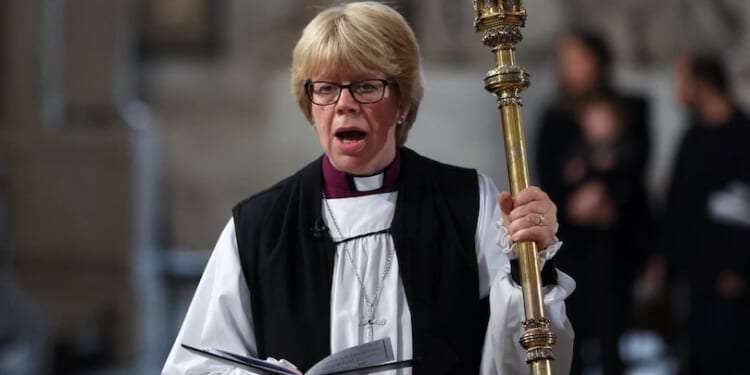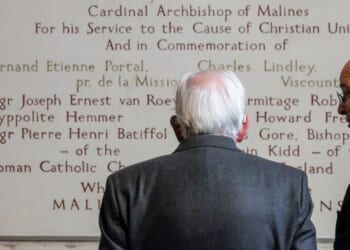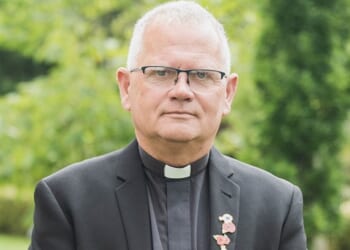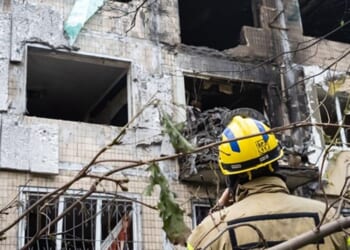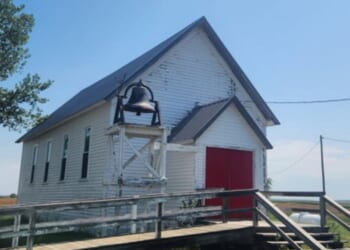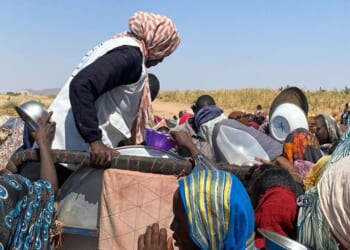(LifeSiteNews) — The Anglican Communion, a global body of around 85 million Christians who adhere to the theology and spirituality of the protestant Church of England, has experienced a major schism. An October 15 statement from the Global Fellowship of Confessing Anglicans (GAFCON) announced that it has severed ties with the archbishop of Canterbury and established a new Global Anglican Communion, citing the Church of England’s “abandonment of the Scriptures” and support for homosexual “blessings.”
The news follows statements and opposition to the appointment of Dame Sarah Mullally to the position archbishop of Canterbury, primate of England in the Anglican Communion and de facto leader of the Church of England.
Only days after Mullally’s October 3 appointment, Archbishop Henry Ndukuba (Anglican primate of Nigeria), whose regional church represents 18 million Christians, authored a communiqué which complained that Mullally’s appointment “is a devastating one that ignores the current situation and challenges being faced by the Anglican Communion.”
Ndukuba continued to say that Mullally’s appointment resembled “a double jeopardy; first, in its insensitivity to the conviction of the majority of Anglicans who are unable to embrace female headship in the episcopate, and second, more disturbing that Bishop Sarah Mullally is a strong supporter of same-sex marriage.”
GAFCON, of which Ndukuba’s protestant Church of Nigeria is a member, claims to represent 85 percent of the Anglican Communion’s 85 million Christians. Largely populated by conservative African Anglicans, it also represents communities of Anglicans in the Americas.
Its decision to formally separate from the Church of England was detailed in a statement issued by GAFCON Chairman Archbishop Laurent Mbanda, primate of the Anglican Church of Rwanda, and followed a gathering of GAFCON primates on October 15. The decision formalizes a major schism within Anglican Communion.
The communiqué, titled “The Future Has Arrived,” declared that GAFCON encourages Anglican provinces “to amend their constitution to remove any reference to being in communion with the See of Canterbury and the Church of England” and that it rejects “the Archbishop of Canterbury, the Lambeth Conference, the Anglican Consultative Council (ACC), and the Primates Meeting, which have failed to uphold the doctrine and discipline of the Anglican Communion.”
The announcement outlined eight resolutions, stating that the Bible, “translated, read, preached, taught and obeyed in its plain and canonical sense,” is the only foundation of the new communion.
GAFCON insists that the Church of England’s 2023 approval of homosexual “blessings” on a three-year trial basis, which was paused in October 2025 before implementation due to unresolved practical details, resembles a departure from orthodoxy and Scripture. GAFCON’s communiqué condemned communion with provinces advancing such a “revisionist agenda” that “has abandoned the inerrant word of God as the final authority and overturned Resolution I.10” of the 1998 Lambeth Conference, which defined marriage as a lifelong union between one man and one woman.
An earlier October 3 GAFCON statement asserted that the Church of England has “relinquished its authority to lead,” asserting that leadership should “pass to those who uphold the truth of the gospel and the authority of Scripture in all areas of life,” particularly on marriage and sexual morality.
The new “Global Anglican Communion” (which will presently exclude the Church of England, the historical origin of Anglican Christianity) will function as a fellowship of autonomous provinces, as established at the first Lambeth Conference in 1867.
Member provinces will not attend meetings called by the archbishop of Canterbury and will cease funding or receiving funds from the ACC. Membership will require “assent” to the 2008 GAFCON Jerusalem Declaration.
A Council of Primates will elect a chairman, described as primus inter pares (first among equals), at the G26 Bishops’ Conference in Abuja, Nigeria, from March 3-6, 2026.
Mbanda declared, “We have not left the Anglican Communion; we are the Anglican Communion,” asserting GAFCON’s leadership of the global body.
GAFCON represents an estimated 40 million Anglicans, primarily from the Global South, with its Primates’ Council comprising leaders from nine recognized provinces – Alexandria, Chile, Congo, Kenya, Myanmar, Nigeria, Rwanda, South Sudan, and Uganda – plus three “non-recognized bodies”: the Anglican Church in North America, the Anglican Church of Brazil, and the Reformed Evangelical Anglican Church of South Africa.
The schism arrives despite October 15 attempts from within the Church of England to placate the concerned African prelates. Bishops halted planned standalone services for homosexual “blessings,” requiring a two-thirds majority from the Church’s governing body – bishops, clergy, and lay members – before such rituals can proceed.
Stephen Cottrell, the Church of England’s second-highest-ranking bishop, said the decision followed “additional legal and theological advice” and acknowledged it would be “difficult and disappointing” for some members. The Church of England Evangelical Council stated that the bishops’ decision “had not acted decisively enough to resolve the issue of blessings and left several questions unanswered.”
GAFCON, whose leaders rejected this attempt at reconciliation, has its origins trace to the 2003 consecration of openly homosexual Bishop Gene Robinson by the Episcopal Church, a key moment in disputes over biblical authority and sexual ethics. The group has not participated in Instruments of Communion meetings since 2016.
The Episcopal News Service described GAFCON’s action as establishing a “rival network,” ending engagement with Communion structures. Premier Christian News termed it a “major split,” while Anglican Ink reported GAFCON “taking control” of the Communion.
Religion Media Centre observed that GAFCON’s 11-member council contrasts with the 42 primates in the broader Communion, with “extensive and interwoven financial, institutional and historical connections” potentially complicating the split.
The schism creates two competing Anglican bodies, with significant consequences for global Anglican unity.

